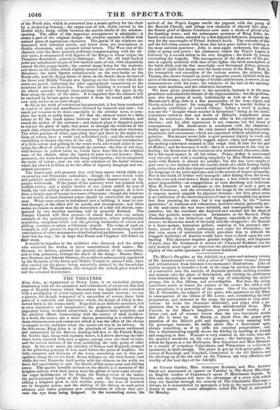The Miser's Daughter, at the Adelpbi, is a paste-and-scissors version
of Mr. AINSWORTH'S novel, with a series of" tableaux vivans," dressed and attitudinized from GEORGE Cauntsmarres illustrations. Like all similar attempts to transfer a book to the stage by putting the dialogue of a narrative into the months of dramatis personte, making costume and scenery take the place of description, and visiting the performers with intermittent fits of catalepsy by way of embodying the artist's groups, this is flat, lifeless, and unintelligible. Nor does the icting contribute much to lessen the tedium of the scene ; for, with a very few exceptions, it is unworthy of the name. One of the exceptions is Mr. E. STERLING, the adapter of the piece, who appeared as the Miser in consequence of the illness of Mr. LYON; and, considering his brief preparation, and newness to the stage, his personation is very meri- torious : he looks the character admirably, and plays with a na- turalness that is more impressive than melodramatic force. Miss FAUCIT, in the Miser's daughter, proves herself worthy of a better part, and of warmer lovers than the two inanimate stocks that she is beset by. 0. SMITH, as Jacob Post, the gaunt grim guardian of the Miser's gold and daughter, is very amusing with his grotesque humour: he stalks about like a benevolent ogre, always munching, as if to stifle his cannibal propensities ; and, like a discriminating mastiff, shows his fidelity by snarling at friends and snapping at foes. WRIGHT is very comical as the valet, who airs his master's wardrobe on his own person : the burlesque deuce, in which he figures as a lax Harlequin, Mrs. GRATTAN and Miss MURRAY as a couple of corpulent Columbines, and WmungsoN as a Clown ra spectacles, is droll enough. The piece is got up with great pains: the scenes of Rauelagh and Vauxhall, illuminated in the old fashion, and the blowing-up of the old mill on the Thames, are very effective, and worthy of the best days of the Adelphi.


























 Previous page
Previous page